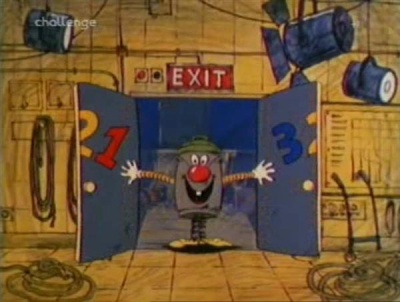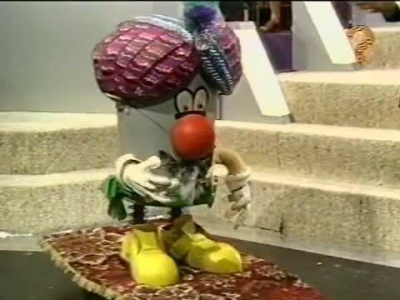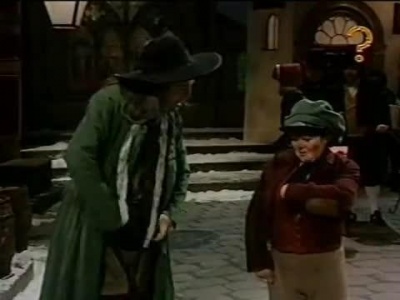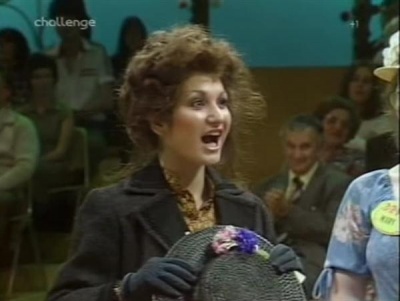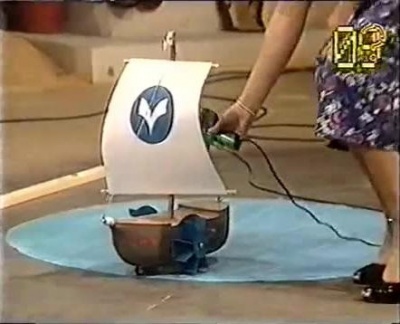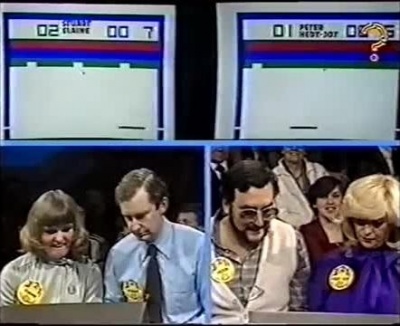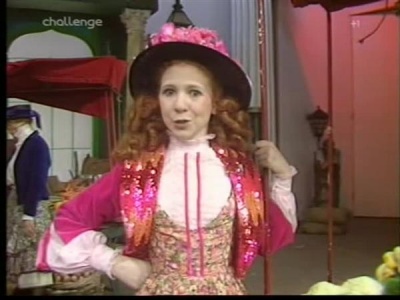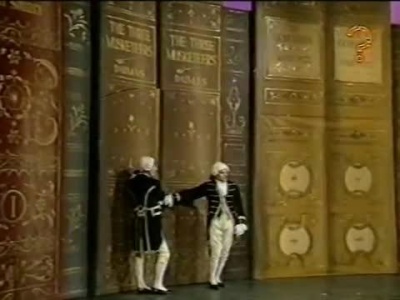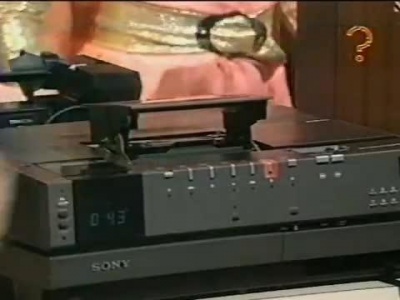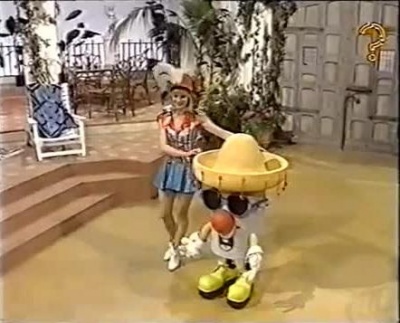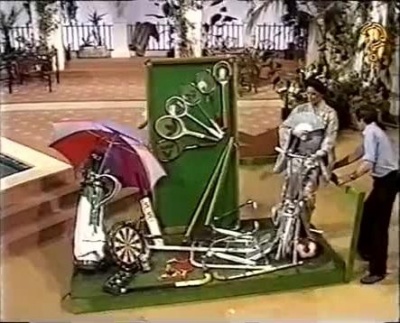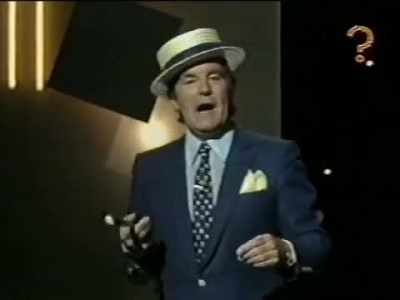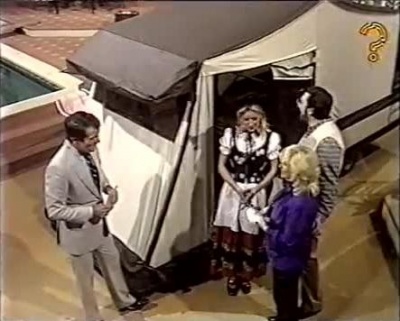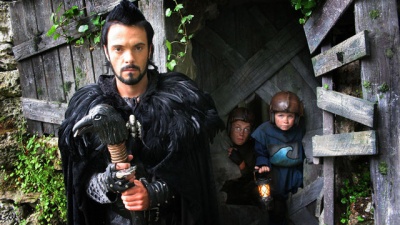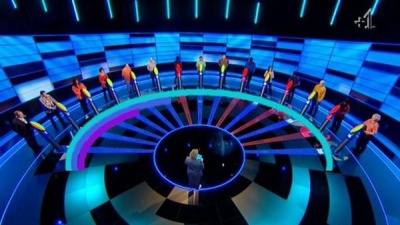Weaver's Week 2014-07-06
Last Week | Weaver's Week Index | Next Week
This week, the eyes of the world are on Leeds, as the Tour de Yorkshire sets out on its tour of the area. It'll spend three weeks going up the Moor d'Huez, traversing the Grassington Pass, and passing the Massif Central Pile o'Pies, before finishing along the banks of the Seine in Paris, a suburb of Hebden Bridge. We make no apology for returning to God's own country for a nostalgic review, in three — two — one — you're on.
Contents |
3-2-1
YTV (a Trident Television company) for ITV, from 1978
For this review, we're looking at the first three series of 3-2-1, shown in summer 1978, autumn 1979, and new year 1981. These series have recently been repeated on the Challenge channel. Seeing these old shows again has reminded this column just why we got into game shows quite so much – and just why we propose little improvements to good shows.
3-2-1 begins with the Yorkshire Television ident. A chevron, with the words "Yorkshire Television" in front. Then the chevron takes off, zooms around the screen, and becomes a cartoon firework. Its magic falls to the ground, and animates a dustbin. This anthropomorphic character is full of life, it bounds across the studio floor, turns cartwheels on top of a car, and promises a show of fun. Then we see host Ted Rogers at the top of the stairs. The 1979 series also introduced the resident comedians and hostesses, but more of them shortly.
Ted comes down the stairs, perhaps shaking hands as he goes, and welcomes us to the show. He will crack some jokes – topical ones in the opening series, timeless by the later run. He'll have some comic interplay with the resident comedians – Chris Emmett throughout, Mike Newman in most shows, Debbie Arnold in the first series, Felix Bowness afterwards. And Ted will introduce Dusty Bin, who is accompanied throughout by Karen Palmer.
Dusty is always dressed to match the week's theme, though he's only ever got a walk-on part. (Well, a roll-on part...) In later years, Ian Rowley would make a robot Dusty Bin, able to move his eyes and waggle his arms. In these early years, Dusty can only ever change the expression on his face, and he only ever does that when there's a close-up on Ted.
It quickly became clear that Dusty Bin was a favourite: the cute dustbin with fashion sense represented the booby prize, but children didn't mind about that. It's a cute dustbin, it's a real-life cartoon character, rolling amongst these humans. There was fan mail, children sent drawings, and the 1979 series ended with a wall of pictures sent in by viewers. Did Blue Peter of the present day borrow that idea for their Badge Wall?
We get ahead of ourselves. The contestants are introduced, two couples of a lady and a gentleman. Usually the players were married couples, occasionally other relations or just work colleagues. Each has one of the hostesses standing by them, and Ted will have a quick chat with the players before the first round of the quiz. In the first series, it was a very quick chat, more leisurely after the great quiz reforms of 1979.
The 1978 series started with three rounds of play, and contestants were asked questions with lots of possible answers – "trees found in Britain" – or that fitted a particular sequence – "count backwards in 14s from 227". Players would always answer in turn, though they could mime answers to each other. The pairs would be stopped if they made a mistake (something that didn't fit), repeated an answer, or ran out of time – 30 seconds for ten answers. £1 per right answer in the first round, then whatever they win is what they play for in the next round. A score of £800 was achieved at least once, usually players would come out with £240 or so.
When the programme came back in 1979, there were changes. The quiz was now reduced to two rounds, making for a much less rushed beginning. The first round – now played for £10 – was still a category, but Ted had a slightly evil streak. "Languages spoken in Asia – we'll give you Japanese as an example, but you must not use it." As in the prior series, an error would bring forth a particularly corny joke from one of the comedians, many of the gags still had price tags in shillings and pence.
The second round – and the entire quiz in 1981 – was Ted giving a name, and the contestant responding with a fact associated with it. Ted might ask after the country where Pierre Trudeau was prime minister, or the sport played by Lucinda Green. An error would stop the round there and then, but players could pass on a question.
Whichever couple had the lowest score would leave us after the quiz. Except they wouldn't in 1978: the week's quiz winners were invited to come back on the next show, and could keep on winning. Some couples earned more than £2000 before being defeated – that's around £8000 in present money.
And then came the first break for adverts. Unless you're watching on the Challenge channel, where they insist on putting a break half-way through the quiz round.
Next, the second elimination. This would eventually be devalued to a single trivia question, asking who wrote the Water Music. At this early stage, the elimination was a reason to tune in, not just a bolt-on. The 1978 series had a two-part elimination task: an observation quiz based on the first sketch, and a physical game. Throw quoits over a target. Or transfer ping-pong balls between two trays while bouncing on space hoppers and holding the balls in chopsticks. The questions were shown for viewers to play, or they could just chortle at grown-ups on large inflatable orange rubber spheres clutching chopsticks.
By 1979, the observation quiz had been eliminated – indeed, the first sketch had been chopped in its entirety. The winner would be determined by the physical task, such as blowing a yacht across the floor with a hairdryer. This, apparently, counted as prime-time entertainment. 20 million people would watch this – well, they would when the BBC was on strike, and there was no other television to view.
(Sidebar: There's a slight myth that 3-2-1 was the mainstay of ITV's schedules when it returned from its own strike in October '79. We don't think this is quite correct. About half the series had been completed before the strike started, the first episode went out on ITV's first night, and the rest played on the regular Friday night slot. What may have made 3-2-1 stand out was the fact that it was the only new programme on a channel propped up by repeats for a few weeks.)
For the 1981 run, there was a new elimination game. Computer breakout. The two teams would play on a game linked to the television set, hitting a ball against a wall and bouncing it back with a bat. Miss the ball, and play goes to the partner. Whichever team scored the most in a minute, with a maximum of seven balls, is the winner. And behind the action is a lovely little electronic tune from Johnny Pearson, it twiddles and picks up speed and becomes more insistent as the minute progresses. Almost as memorable as the maze on Four Square, it's a classy piece of music.
Indeed, we tend to forget just how good the music was on 3-2-1. There was the bold and brassy main theme, bouncing along with the cartoon Dusty Bin. Then there was Dusty's theme, a repeated downwards motif ending with a collapse. It screamed "comedy character" from the first note. Then there was a variation on the main theme to meet the contestants, and to open and close each part, and to introduce the prizes rejected by the players. In these days when there are CDs of cues from Who Wants to be a Millionaire, and one can download the soundtrack to Avanti un Altro, it's slightly surprising that the 3-2-1 music isn't anywhere on the internet.
The heart of 3-2-1 was its sketches – six in the first series, five thereafter. These were variety skits, often the resident comedians Chris and Mike would engage in comedy cross-talk, or would string together many bad puns. Each show included two or three special guests, and they might join in the skit. A few were permitted to sing and dance – the youthful Bonnie Langford appeared in all of the first three series, and always contributed a quality performance.
High quality and imagination was also seen on the sets. Yorkshire Television didn't have the budget to recreate Venice in the studio, but they could provide a small and shallow canal and a bridge going over it. They couldn't build a new library, but they could paint the set so that it looked like they had giant books. The show didn't have the massive production values (read: huge budget) of Scavengers, but no-one could ever say it was underfunded.
By 1981, it was clear that the show was going more towards variety – on one episode, The Great Soprendo performed a magic trick, there was flamenco dancing, and the obligatory comedy performances, including turns by contemporary stars Bob Todd and Rita Webb. Reducing the number of sketches from six to five had allowed each performance to breathe, it gave us just enough room to get immersed in the production.
We got the impression that the producers wanted to make a show that was mostly song and dance – they'd been promoted from Friday to Saturday nights – but hadn't quite got the bookings to make it happen. By 1982, they'd create The Brian Rogers Connection, a dance troupe who would appear every single week.
The last aspect of 3-2-1 was the prizes. Each week, there was a booby prize, represented by Dusty Bin. If the players won that, all they'd get is a brand new dustbin. Each week, there was a star prize. In 1978, always a motor car. In later series, it was sometimes a car, other times a holiday abroad, occasionally some rare luxury item.
There was a range of prizes between these extremes. Some were prosaic – a new wardrobe and clothes to go in it, hi-fi and electronic equipment. Some were entirely bizarre – one couple won gold nuggets, another offered a greyhound to go racing.
All of the prizes were clued by a riddle. Someone from the sketch would come over to the table, offering an object from the set, and reciting a rhyme. When three objects were on the table, Ted would insist that the couple rejected one of them. He'd open the envelope, and link the rhyme to a prize, then bring it on set. Look at what you could have won!
Before we continue, let's give five riddles from the "Holidays Abroad" episode in 1981.
Clue 1 – A map. "Keep this at home, or toe the line, you may do one or the other. But as this rhyme unfolds, you may home in on another."
Clue 2 – A teabag. "The Great Soprendo had some sport tricking the hotel guests. A fitting prize, then, this might be, to match the other jests."
Clue 3 – Half a castanet. "Castanets and artful heels ring out to the sound of guitars. Though you may be tempted to win this prize, we know it will still be ours."
Clue 4 – Sunglasses. "Lying in the sun was fun till our Rita came on the scene. Then his fun wasn't worth a tanner, but will you think that yours has been?"
Clue 5 – A 100 peseta note. "A health spa, in which is a clue, though you may have a doubt. We wouldn't try to send you up if you throw this out."
Wordplay, puns, and trickery were all used to conceal the prizes. All of them give enough of a clue to hint at the answer, most of them give enough of a false lead to hint at something different. This became a problem in the 1978 series, particularly when the players knew that two of the final objects were a car and a bin. Changing the star prize helped to mix it up, make the game harder – and keep down the budget.
As we said, all of the prizes were brought on stage. Here's a fitted bathroom. Here's a fur coat. Here's a high-tech Betamax VCR. The hostesses might have to be in position – and in costume – three times during the show.
Ted consistently referred to the objects as "Macguffins" in the first series, an homage to the master of concealed objects Alfred Hitchcock. TV Tropes defines the Macguffin as "a device used to drive the plot. It won't pop up again later, it won't explain the ending, it won't do anything except possibly distract you while you try to figure out its significance."
In its original form, 3-2-1 was a fast-paced show. Possibly too fast – nine rounds of the quiz, an elimination round, six sketches, six items to explain. It all went so quickly, there was barely time to draw breath. The changes for later series gave the format more room to breathe, we could appreciate the contestants, enjoy longer performances, and get to know the subtle running jokes (like Mike Newman's knitting, or the posh hostess who called the host "Edward".)
A few years ago, ITV began a push to bring back shows for the nostalgia value. Mr and Mrs came back, so did Catchphrase, and Through the Keyhole. We've had no sniff of a 3-2-1 revival, though. Could it work these days? We reckon so, and we reckon that the 1979-81 incarnation is the right one to revive – later years became too much song-and-dance, too much about the booked guests, and pushed the players and the prizes too far back.
Yes, there will need to be changes. Top prize on the quiz might now be £5000, it's still about two months' salary for the average person, and most couples would "only" win £2000. We'd rather have the elimination bit be an entertainment in its own right; yes, it's difficult to come up with games that anyone can pick up and play, but imagination is not limited.
Let there be resident comedians, let there be guest stars. And if they can include a turn by Chris Emmett, or Bonnie Langford, or first show winner Janice Long, or Danny Rogers (Ted's son), book 'em. We know there is talent to write the riddles, and there will surely be an urchin who hangs around with unsavoury dustbins.
Perhaps the most difficult casting decision will be the host. We always saw Ted Rogers as completely unflappable. He wasn't in charge of proceedings, because 3-2-1 often felt like it was happening around the host. But Ted was a master of improvisation, he could cope with whatever the show threw at him. Amongst contemporary talents, we'd choose Tim Vine – he can think at a hundred miles an hour, and whatever a show can throw at him, he'll make it entertaining.
Our putative revival would have to make changes, of course – sponsorship and product placement would allow bigger prizes, with more of the "wow" factor from the original, something we found missing from Temptation Island. Whether ITV would want to have a weekend slot for it, or if they'd put it out in the Feelgood Wednesday spot with Mr and Mrs and Big Star's Little Star, that's another discussion.
Enough dreaming, we have some riddles to answer. In the order they were rejected:
Clue 2 – a teabag. "Sport" and "fitting" were the key words here, along with a bag for tees. It's golf clubs and sports equipment.
Clue 3 – half a castanet, which is a useless item, Dusty Bin is an artful heel, and the prize will remain in Yorkshire after the show. Yes, it's the winner of Game Show Hat 1981, Dusty Bin and his sombrero!
Clue 4 – sunglasses. "Lying in the sun" and "tanner" should have clued into a sunbed.
Clue 5 – 100 pesata note. Reversing the logic of the rhyme, if the contestants don't throw this out, they will be sent up – to "spa in". Two weeks in Marbella, to be exact.
Which means they won the prize behind the map – "Toeing the line", or is that "towing the line". "Home in on another", and something that unfolds like a map. It's a trailer tent that doesn't need construction, it simply unfolds. A relatively conservative set of prizes this week, and we can debate whether Peter and Hedy-Joy won the star prize or not.
Certainly we've thoroughly enjoyed the 3-2-1 reruns, they've reminded us of how good game shows weren't, and how good they were.
Only Connect
Semi-final 2: Europhiles v Software Engineers
The Europhiles get the spirit of BBC News 24 with flags showing the last letter of the country. "It's the last letter of the country," but this isn't enough for our host. She's looking for "the only countries with names ending in those letters". Nasty, and not tremendously well clued. The audio round is songs that share their names with Stephen King novels. 0-0.
Back to the Europhiles, whose clues include "Giant lizard over New York" and "Co-producer, Thriller", but neither side know this is Q, as in "Q The Winged Serpent." What was a variant of patience, a 1947 Agatha Christie radio play, assassins in "Dr No", and a nursery rhyme. Neither old maid nor spider, but three blind mice. It's still 0-0. Have we tuned into the football world cup by mistake? Is anyone going to stand there and cross their arms and look surly?
Detectives in Tintin, π and ψ, the Europhiles score two points by adding one letter. The Software Engineers also get off the mark, with things lasting nine days, such as Kempe's progression from London to Norwich by morris dancing. These days, the Great Eastern train company ... ah, you've already got the punchline. 2-1 to the Europhiles.
Sequences begin with more pictures for the Europhiles, which turn out to be Saint – Packer – Giant. Apparently, this is winners of the Super Bowl, a competition for football sides, and the next is Raven. Yep, as in chap from one of the greatest game shows ever. Neither side knew that, and neither knew the top of a rainforest was the Emergent Layer. 2-1.
Ooh, lovely. Tony Blair as PM years 1-3; Will Carling as England captain years 1-4, John Major as PM years 1-4, and the answer is obviously Mitterand's presidency the final four years. They come out as 97-99, 88-91, 90-93, and 92-95, the FM bands claimed by the BBC national radio networks {1}. Maximum amounts of legal tender with coin for the next questions, and neither side knows that £1 and £2 are unlimited. {2} 2-1. Still.
Dios, Donne, Hommes, Mein Pferd, being a quotation from Charles V. "Horrible!" exclaims Victoria, going through quite the most difficult question at a semi-final ever. The hierarchy of angels (going down) scores 2 for the Software Engineers, but surely the Europhiles should get One Squillion points for answering the question before it was even asked. No? No. 3-2 to the Softengines.
Software Engineers defend their lead at wall 473, a round including 1980s albums, photographic development, confirmation that a radio message has been received, and the team is banging out on a fourth connection. Photos and radio come out, extra-terrestrials emerge later, but Alf is a number one album. And jolly good it is too. Five points.
Wall 474 for the Europhiles, a slow beginning springs into life with theatres missing their initial letter. And then it dies back down: the team is just jabbing in the dark. Parts of the ear and geometric curves are explained when revealed, the sites of oracles do not. Four points!
So, 8-6 to the Software Engineers going into Missing Vowels. After things served cold, it's 8-8. Opening words of novels extend the Europhiles by four points, three of their own and a missignal from the opposition. Weasels confirm the Europhiles' win, by the final score of 11-7.
Contrary to Victoria's claim, millions of people won't be watching the football this time next week: that's tonight. Viewers to Germany – Algeria are hoping for a match almost as gripping as tonight's Only Connect, such as Costa Rica vs Greece last night. {3}
{1} On a point of pedantry, the sub-bands are 97.7 – 99.8, 88.1 – 90.2, 90.3 – 92.4, and 92.5 – 94.6 but higher outside England. Why Radio 2 pretends it goes all the way to 91.0 is not clear.
{2} But try telling that to certain automatic supermarket checkouts near us, which resolutely refuse to accept toonies on the flimsy pretext that the machines can't tell them apart from a 2-euro coin.
{3} Our knowledge of men's football is minimal, so we chose teams to support based solely on the quality of their recent Eurovision Song Contest entries. Following the exits of Bosnia-Herzegovina, Russia, and the US of America, we're left backing Germany.
This Week and Next
Are we surprised that Fifteen-to-One has been renewed for a second run? Not really: it's a reasonably cheap show, it did tolerable business, Channel 4 doesn't have very many good ideas, it helps keep the celebrity version going on Friday nights, and did we mention it's cheap?
BARB ratings in the week to 22 June.
- 10.4m for the men's football world cup, England versus Uruguay. 4.5m for the top game show, Celebrity Masterchef on Friday.
- Then 2.85m for Mr and Mrs, 2.4m for Celebrity Catchphrase, and 1.8m for The Chase.
- Channel 4's showing of The Hunger Games pulled 2.7m; Channel 5's Big Brother had 1.65m viewers. And less choppy editing.
- Also in that 1.6-1.8m region were 8 Out of 10 Cats Does Countdown, Mock the Week, and Antiques Road Trip.
- Just 595,000 for Only Connect, there's 320,000 for Dinner Date on ITV2, and the CBBC commentary on the men's football world cup attracted 8000 viewers. Cel and Hacker enlivened that game, somehow.
New shows this week include Ultimate Dealer (C4, 4.30), Couples Come Dine With Me (C4, 5pm), a behind-the-scenes look at University Challenge The Auditions (BBC2, Mon and Tue), and The Million Pound Drop Live Not Live (C4, 8pm Fri). Fort Boyard (TV5, 5.35 Sat) includes Nathalie Simon from diving show Le Splash! Tipping Point Lucky Stars (ITV, 7.30 Sat) keeps its guests under embargo until Tuesday, but we think Jonathan Ross would be good fun.
Photo credits: Yorkshire TV, BBC Scotland, Remedy / Argonon.
To have Weaver's Week emailed to you on publication day, receive our exclusive TV roundup of the game shows in the week ahead, and chat to other ukgameshows.com readers, sign up to our Yahoo! Group.


